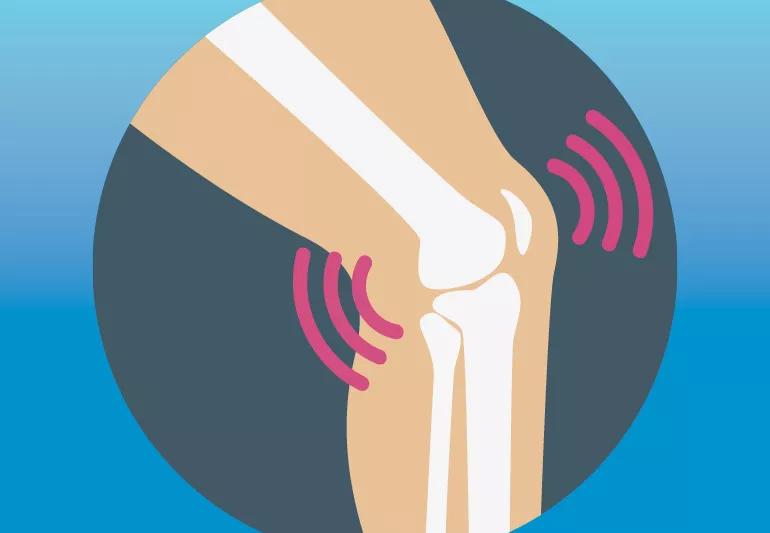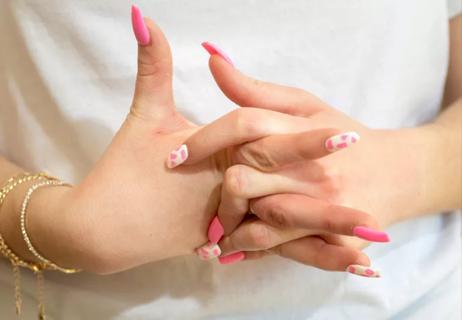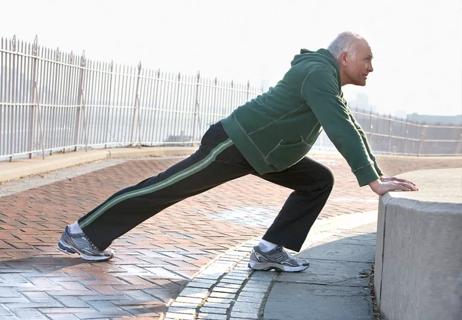It’s a normal, common occurrence, but popping with pain or swelling may be a sign of an injury

We’ve all experienced it: Knees that snap when we stand up, a neck that cracks when we turn our head and ankles that pop when we rotate them.
Advertisement
Cleveland Clinic is a non-profit academic medical center. Advertising on our site helps support our mission. We do not endorse non-Cleveland Clinic products or services. Policy
Joint cracking can be loud — like, really loud. We’re talking up to 83 decibels — that’s about the same volume as a running garbage disposal or a diesel truck rolling along at 40 miles per hour!
Chiropractor Andrew Bang, DC, can attest to just how loud those joint noises can be. “We do try to warn patients, but there are sometimes a few gasps in the office when the patient doesn’t realize that it’s going to be that loud,” Dr. Bang says. “And when you’re the one popping, it sounds way louder than a garbage disposal, especially when it’s in your neck because it’s so close to your ears.”
It’s no wonder that many people think there might be something wrong with their joints. The fact that those popping noises seem to happen more as you age can make them even more disconcerting.
While creaking and snapping joints might be alarming, they usually aren’t something to worry about, according to orthopaedic surgeon Kim Stearns, MD.
“It’s a normal, common occurrence,” Dr. Stearns adds.
Dr. Bang concurs. “The noise you’re hearing is safe. It helps restore a range of motion and decrease pain.”
But if the cracking’s coupled with consistent pain or swelling, that can be a sign that something is wrong. That’s the time to see a doctor, Dr. Stearns states.
Advertisement
“As long as it’s not painful, joint noise is OK,” he reassures. “If there’s pain, you may have an injury then that requires treatment.
Video content: This video is available to watch online.
View video online (https://cdnapisec.kaltura.com/p/2207941/sp/220794100/playManifest/entryId/1_yknvlz8f/flavorId/1_5f3sgelj/format/url/protocol/https/a.mp4)
Dr. Bang and Dr. Stearns explain that there are four reasons that your joints may make a cracking noise that aren’t a sign of injury:
The most common sources of that telltale crack are synovial joints. Dr. Bang explains that in a synovial joint, the two bones are connected by a capsule or membrane. Inside that capsule is synovial fluid.
“That synovial fluid is like motor oil for our joints,” he continues. “It provides lots of lubrication, so things are slick and move nicely.” That fluid also contains oxygen, nitrogen and carbon dioxide. A popping joint stretches the capsule. “It makes that cracking sound because you’re creating a negative pressure inside of that synovial joint space.”
Ligaments are bands of connective tissue that connect our bones to each other. Also made of connective tissue, tendons facilitate the movement of our bones and help reduce the impact that movement has on our muscles.
Sometimes, Dr. Bang says, that snapping sound you’re hearing are these ligaments and tendons rolling over each other. “You may feel that sensation in your ankle when you move it, or in your knee when you go to stand up.”
It sounds like something out of a horror movie, but skin and muscle fascia separating is normal. To understand what’s happening in this scenario, we need to do a quick anatomy lesson.
Dr. Bang explains that we have different layers of tissue. Below our skin, we have what’s called the fascial layer. “The fascial layer is in between — and separates the skin from — muscles,” he says. “It creates a lubricated protective barrier.”
Take an area where you might have excess skin, like your back. Dr. Bang says, “If I were to grab that skin and lift quickly, you’d actually hear a popping sound. And that sound’s not your joints or ligaments. It’s the skin separating from the fascia that is connected to the muscle layer. It’s similar to what happens in a synovial joint: You’re creating negative pressure inside of a tightly sealed area.”
Many people notice that their joints seem to make more noise as they get older. There’s a good reason for that.
“The older you get, the more noise your joints can make because some of your cartilage wears away as part of the normal aging process,” Dr. Stearns reports. “Then, these surfaces get a little rougher and so you get more noise as they rub against each other.”
Advertisement
Dr. Bang agrees. “As long as it’s not hurting, we usually aren’t super concerned.”
Cracking your knuckles is an example of the most common cause of joint popping: Gas escaping from a synovial joint. When you crack your knuckles, the sound is coming from the compression of nitrogen, oxygen and carbon dioxide bubbles that naturally occur in the spaces of the joints, Dr. Stearns says.
The cracking is the sound of gas being released from the joint, an action called cavitation, Dr. Stearns further explains. The sound isn’t a cause for concern.
And despite what your mom said, you’re not going to make your knuckles too big or develop arthritis by cracking them.
“The belief that cracking your joints is bad for them is wrong,” Dr. Stearns reiterates. “My mother used to tell me don’t crack your knuckles. But sorry, mom: There’s no science to say it’s bad for your joints.”
Dr. Bang concurs, but he also offers a caveat.
“If you constantly crack a joint, you’ll still function fine. But feeling like you need to crack a joint that often may signal a problem.”
Dr. Bang elaborates: “We feel the need to crack because the pressure builds up in the joint over time. The joint is getting stuck in one position, tightening up, so you feel like you need to crack it.”
Advertisement
If you can avoid putting pressure on the joint, you won’t feel like you need to crack it as often, Dr. Bang says.
Cracking feels good because it increases the joint’s range of motion. But if cracking your joints becomes a habit, you risk getting too much of a good thing. If your ligaments and tendons get too loose, they won’t do as good a job protecting you from injury.
You’re never going to stop your joints from creaking entirely because it’s both a function of our anatomy and an expected part of joint aging.
But there are some things you can do to keep things moving smoothly.
Dr. Bang explains that the popping joint isn’t actually what gives you pain relief: It’s the quick stretching of the muscles and soft tissue fibers that surround the joints during a chiropractic adjustment. So, it’s not surprising that exercise is one of the most important things you can do to keep your joints healthy and happy.
“We say ’motion is lotion’ — the more you move, the more your body lubricates itself,” Dr. Stearns shares. “When you’ve been sitting or lying around, fluid in the joints doesn’t move. The more active you are, the more your joints lubricate themselves.” The sounds will come and go, depending on how you position your body when you sit and sleep and how you use your body when you move.
Advertisement
That’s why, in addition to staying active and stretching, you also need to evaluate your surroundings.
“If we can identify what it is that we’re doing that puts pressure on the joint and we stop that behavior, we might not feel the need to crack our neck or our finger or whatever anymore,” Dr. Bang says.
You may need to adjust your computer monitor or hold your phone differently, or work on your posture. According to Dr. Bang, little alterations can make a big difference.
There are several different reasons why you might hear a pop, click or crack coming from one of your joints, none of which are cause for concern. There are only two scenarios where a popping joint requires a trip to a healthcare provider:
If you don’t fall into either of those categories, then your body’s soundtrack shouldn’t be a source of concern. Just remember to stay active and practice good posture — that’s the best way to keep your musical joints in tune.
To learn more from Dr. Bang on this topic, listen to the Health Essentials Podcast episode, “Snap! Crack! Pop! Why Your Joints Make Noise.” New episodes of the Health Essentials Podcast publish every Wednesday.
Learn more about our editorial process.
Advertisement

Fish, cruciferous veggies, turmeric, yogurt, ginger and green tea all reduce inflammation

As long as it’s done correctly, knuckle cracking is safe

The goal is a balance of aerobic activity, flexibility exercises and muscle strengthening

These creams that you apply to your skin can actually help reduce localized pain, swelling and inflammation

While an ultrasound shows your muscles and tendons, an MRI also shows your joint cartilage, bones and heart chambers

Arthritic knees can benefit from bridging, mini squats, balancing exercises and other stretches

20 minutes is the max — and you may actually need a lot less

Wearing shoe inserts, maintaining a healthy weight and using cold or heat therapy may give you relief

The tropical fruit is a good source of antioxidants and vitamin C

Most people fall asleep within 10 to 20 minutes, but if your experience is different, adjusting your sleep schedule may help

Exploring your hidden side can lead to better understanding of what makes you tick